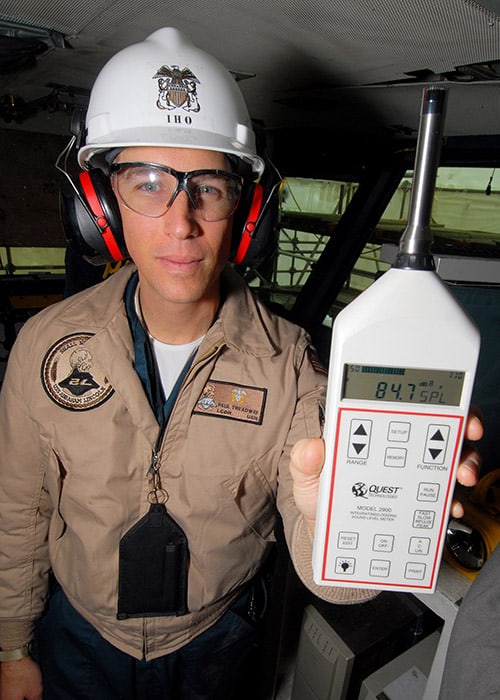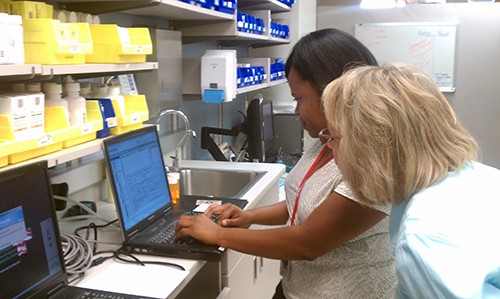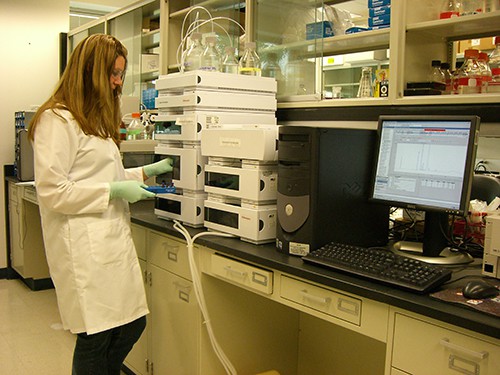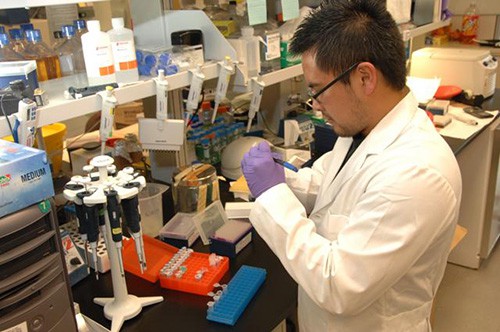
It’s been proven over and over again. Getting a college degree of any kind pays off. And earning a master’s even more so. What follows are the 50 top-paying occupations for master’s degree holders, according to data compiled from sources including the Bureau of Labor Statistics.
Featured Programs
Keep in mind that salaries range broadly for master’s degree holders–depending on industry and company, location, the nation’s economy and your level of experience, and annual median wages can be anywhere from $50,000 to $100,000 or more. That compares to average pay of $40,500 for a worker with a bachelor’s degree, according (again) to the U.S. Bureau of Labor Statistics.
The salaries listed are average starting salaries. More senior level experts, of course, make more in compensation.
50. Genetic Counselors

Average Salary: $31,340
A gene counselor would do what you might expect: Provide information and support to families who have members with birth defects or genetic disorders and to families who may be at risk for a variety of inherited conditions.
These counselors are adept at identifying families at risk, interpreting information about the disorder, analyzing inheritance patterns and risks of recurrence, and reviewing all the available options with the family.
49. Social Workers

Average Salary: $35,510
Social workers are charged with improving the lives of their patients and clients. In doing so, they serve in a variety of fields, but public health and medical social workers specialize in working with patient who may have acute or chronic diseases or ailments.
Bottom line: They provide the support that is needed for patients to return to work, school, and home life.
48. Substance Abuse Counselor

Average Salary: $38,000
This is one of the most crucial social work jobs imaginable and its importance cannot be understated. Substance abuse counselors help people recovering from drug addiction, and behavioral disorders, such as an eating disorder. They also often work with parents as a guiding force for helping patients integrate back into areas of their lives where their behavior has left a destructive trail, including work and personal relationships. But substance abuse and behavioral disorder counselors don’t only offer their expertise to patients. Counselors often run outreach programs to warn others about the dangers of addiction and encourage a healthy lifestyle.
Hearing every day about the devastating effect addiction has had on a person’s life can be an emotional experience, so those who wish to enter this field should have a temperament that mixes empathy with patience. It’s a stressful, but needed occupation.
47. Community Counselor

Average Salary: $39,400
A community counselor provides counseling support and rehabilitation services for people going through all kinds of difficulties in life. A counselor interacts with people of all ages, groups and families, as well as members of related service fields like health care or school administration. A counselor’s typical daily duties can include interviewing and evaluating their client, identifying goals, designing strategies for treatment and helping to implement and maintain those strategies. Counselors have a high degree of responsibility to their clients and deal with difficult situations on a regular basis.
Since counselors provide services to a wide variety of groups, they can work in many different settings, such as schools, health care centers, rehabilitation facilities, prisons or private practice. Most counselors work full-time in an office setting; however, some counselors may work nights, evenings and weekends to accommodate the needs of their clients.
46. Dietician

Average Salary: $44,900
As a dietitian you’ll translate scientific information about nutrition into practical advice to help people make health-conscious decisions about food. You’ll assess, diagnose and treat diet-related problems and aim to raise awareness of the link between food and health to prevent future problems.
Although many dietitians work for the National Health Service (NHS) in a hospital or community setting, you can also work in:
• the food industry;
• sports nutrition;
• public health;
• the media; or
• education and research.
Working in a hospital, you’ll educate people who need special diets as part of their treatment. You may focus on specialist areas, such as children’s health, diabetes, kidney disease, food allergies or eating disorders. In the community you may be involved in a range of health promotion activities.
45. Marriage and Family Therapist

Average Salary: $45,700
Besides having a master’s degree, you’ll need to become licensed in order to become a practicing therapist.
Marriage and family therapists help people cope with the challenges of life, particularly with regard to mental disorders and personal relationships. They are trained and licensed to independently diagnose and treat mental health and substance abuse problems.
Marriage and family therapy is one of the core mental health disciplines and is based on research and a theory that mental illness and family problems are best treated in a family context. Often trained in psychotherapy and family systems, marriage and family therapists focus on understanding their clients’ symptoms and interaction patterns within their existing environment. MFTs treat predominantly individuals, but also provide couples, family and group therapy.
44. Healthcare Social Worker

Average Salary: $51,000
This profession specializes in offering both individuals and groups with the social and psychological support to cope with illness and disease, whether chronic or acute. Healthcare social workers help people to access services and education related to health problems. The goal is to have the client achieve and maintain a state of optimal health so they can function in their daily lives. Social workers also act as a client advocate, educator, coordinator of care, adviser, and strives to preserve the healthcare and dignity of the population they serve.
A career as a healthcare social worker is perfect for those who enjoy helping other people in times of distress, crises, and uncertainty. But it can be stressful for the worker.
Recommended Schools
43. Public Policy Analyst

Average Salary: $53,000
Public policy analysts identify issues or policy areas to explore, collect and analyze information, then report their findings and propose new policies for addressing problems. For example, if deadly rioting affects a U.S. city, a policy analyst may research the event, collecting and analyzing data to identify underlying social and economic problems that led to the riots, then proposing recommendations for city and state officials to address the problems identified.
Other policy analysts evaluate the effects of existing policies and government programs. For example, analysts may research whether a new policy designed to reduce high school dropout rates among inner-city youth achieved its goals.
42. School Counselor

Average Salary: $53,000
You know all about school counselors. They work with students in elementary, middle and high schools to promote mental health and well-being. They may also help students with certain social and developmental needs receive proper educational care. Parents, the press, administrators and the general public often wonder just what school counselors do on a daily basis.
Gone are the days of school counselors sitting in their office simply handing out college applications, making schedule changes for students who want to drop a class or meeting with the troublemakers in the school. Today’s they help all students in the areas of academic achievement, personal/social development and career development, ensuring today’s students become the productive, well-adjusted adults of tomorrow.
A cautionary word: hiring may be limited, due to slow growth—or decline—in school funding from state and local governments.
41. Disaster and Emergency Specialists

Average Salary: $54,000
These professionals assemble disaster response plans and train other professionals on the best ways to respond to emergencies and disasters. Many of these specialists are employees of the state or federal government. They often work for military as well.
An emergency management specialist is often the first defense against disasters, whether natural or man-made. An emergency management specialist is responsible for helping municipalities and government entities to prepare for disaster, reviewing emergency plans, and working with officials in government and social institutions to ensure that citizens’ needs are met in times of disaster. An emergency management specialist also applies for and manages grant funding for emergency planning and management efforts.
40. Case Manager

Average Salary: $56,508
The primary role of a case manager is to coordinate patient care. They review the patient’s chart and plan of care to optimize the patient’s healthcare experience. They assess, plan, implement, and evaluate, in order to provide a better outcome for the patient.
Case managers specialize in particular areas such as rehabilitation or geriatrics.
39. Community Program Administrators

Average Salary: $57,950
Social workers who enter management positions often oversee nonprofit agencies or social service programs that serve specific communities. In these types of positions, professionals are responsible for coming up with strategic ideas, raising money, budgeting and directing a staff. An example of a social service program would be a homeless shelter for families that provides both immediate and follow-up assistance.
The skills needed are a combination of management and leadership. Management includes functions such as planning, program design, information systems, program evaluation, financial management, human resource management, and supervision. Leadership includes visioning, inspiring and motivating staff, strategic management, and organizational change.
Prospects for social and community service managers is good, and projected to grow 21 percent from now to 2022, faster than the average for all occupations.
38. Criminal Justice Educators

Average Salary: $60,000
These post-secondary instructors teach courses in criminal justice, corrections and law enforcement administration. This role includes both teachers who are primarily engaged in classroom teaching and those who do mostly research.
37. Occupational Health and Safety Officer

Average Salary: $61,300
Individuals in these jobs are responsible for designing policies and procedures that help prevent harm to workers and property. Inspects machines and air quality, designs safe work spaces, and creates policies for workers to follow that minimize job-related hazards.
Primary responsibilities include:
• Create ways to keep workers and the general public safe from harm.
• Design safe work spaces.
• Inspect machines and test for faults.
• Remove defective equipment.
• Test air quality.
• Investigate complaints.
• Reduce absenteeism and equipment downtime.
• Lower insurance premiums and workers’ compensation payments.
• Prevent government fines.
• Conduct safety inspections.
• Impose fines.
• Design programs to control, eliminate, and prevent disease or injury.
• Search for and identify biological, chemical, and radiological hazards.
36. Public Health Nurse

Average Salary: $64,000
Many nursing professionals are specializing in public health and are dedicated to coming up with optimum public health strategies that protect populations from coming down with serious illnesses and diseases.
They work hard to improve unhealthy environments and eliminating the factors that make them so unhealthy.
35. Private Healthcare Consultant

Average Salary: $65,000
In this career, you will try to boost the life quality and the health of people both here and around the globe. You will be working on some of the most challenging public health problems.
It is common for people in this field to work for government agencies such as FDA, HHS, and the CDC.
Recommended Schools
34. Social Work Teachers

Average Salary: $71,000
Social work teachers teach courses in social work to those who aspire to gain employment in the profession. These jobs require a lot of training.
A social work teacher’s areas of instruction includes social administration, social policies, human behavior, and human welfare. May be responsible for preparing and delivering lectures and leading classroom discussions. The teacher may administer and grade examinations or delegate the task to others. Also, will conduct research and case studies in field of interest and may publish findings in trade journals or textbooks. Typically this individual is a leader in the field and has been published.
According to the BLS, sociology professors should expect decent employment prospects through 2020.
33. Criminologist

Average Salary: $72,000
A criminologist delves into the motivations of criminals to help fathom why they break the law. That’s quite a task. They may work with investigators to arrest a criminal, provide insight to lawyers on criminal behavior or work to better understand inmates in jails and prisons.
Criminology is a specialty of sociology, and typically requires a master’s degree. Unless someone wants to enter a Ph.D. program, following an applied, clinical or professional master’s degree program will provide preparation for a job.
32. Occupational Therapist

Average Salary: $72,320
What they do: Occupational therapists help people with disabling physical, mental, developmental, and emotional conditions recover or develop and maintain daily living and work skills. They also help patients such as recently disabled people or amputees compensate for the loss of function.
Occupational therapists assist patients to enhance their motor skills and reasoning and perceptual abilities. If you are in this field, you need to be caring and compassionate, and often receive a tremendous sense of accomplishment.
Occupational therapists need a master’s degree or higher. They’re required to take a program accredited by the Accreditation Council for Occupational Therapy Education (ACOTE) in order to take the national certifying exam.
31. Biostatistician

Average Salary: $73,000
These professionals apply statistics to public health concerns, particularly in the field of biology. You will create experiments and surveys to collect key data that is relevant to maintaining the public health.
You will probably collect data from at risk people and communities.
30. Physical Therapist

Average Salary: $76,310
Physical therapists, also known as PTs, diagnose and treat people of all ages who have a limited ability to move and perform functional activities due to illness or disability. They help patients build flexibility and strength. You will create a plan utilizing treatment techniques to promote a patient’s ability to move, restore function, reduce pain, or prevent disability.
PTs need to be good motivators. According to the Bureau of Labor Statistics about 60 percent of physical therapists work in hospitals.
29. Physician’s Assistant

Average Salary: $81,230
The U.S. health care industry keeps growing in leaps and bounds. Doctors can’t keep up with the demand, which is why physician assistants are becoming more popular. You’ve probably run into one or two at your last doctor’s visit.
Assistants provide diagnostic, therapeutic and preventive health care services to patients, and they don’t have to invest in years and years of medical school to do it. All they need is a master’s degree
28. Health Care Manager

Average Salary: $84,000
These professionals provide a very important role in planning, coordinating and directing services in medicine and health care. You could manage the entirety of a health care facility or you could specialize in one area.
You would probably focus your efforts on a health care facility in an at-need area that has public health issues. It’s a fascinating, rewarding job, running a facility for the needy.
27. Financial Analyst

Average Salary: $84,780
Simply stated, a financial analyst helps people and companies decide how to invest their money. Analysts usually work for banks, insurance companies, mutual funds and securities firms, meeting with company officials to learn more about the firms in which they want to invest.
Recommended Schools
A personal financial adviser, on the other hand, assesses the financial needs of individuals and helps them with investments, tax laws, estate planning and insurance decisions. Almost 30% of advisers work independently and are self-employed.
26. Correctional Facility Psychologists

Average Salary: $85,000
Correctional facility psychologists conduct assessments and therapeutic sessions with inmates in a correctional facility environment. This stressful and potentially dangerous setting of this work means employers offer higher salary in compensation, and competition is usually less of a factor than it is in other professions.
Typically, correctional facility psychologists have a master’s level degree in clinical psychology, although doctoral education increases the salaries available. For those who thrive in a more stressful or uncomfortable environments, this is a great option.
Featured Programs
25. Economist

Average Salary: $85000
An economist studies various aspects of the economy, evaluates the data, and makes predictions, strategies, and models as to the future of the economy. They make focus on a global, regional, national, or even industry based area of study and are employed by branches of the government, financial entities like banks, private investors, financial firms, and more.
There are many different areas of concentration that an economist may focus on as well, including agricultural economics, forestry economics, global economics, and more. The average salary for an economist is around one hundred and six thousand dollars annually.
24. Nurse Practitioner

Average Salary: $90,770
Nurse practitioners serve as primary- and specialty-care providers. Nurse practitioners provide diagnosis, treatments, and consultations. They educate patients regarding preventive care and their prescribed treatments. Some nurse practitioners serve as a patient’s primary healthcare provider. They can work independently or as part of a treatment team. Some nurse practitioners prescribe medications.
According to the American Nurses Association, about 60 to 80 percent of primary and preventive care can be performed by nurse practitioners. They’re increasingly attractive to healthcare employers because they can provide a lot of the healthcare typically provided by physicians and they receive less pay.
Here are some of the most common specialties:
• Family practice
• Women’s health
• Adult practice
• Acute care
• Pediatrics
• Geriatrics
Nurse practitioners need at least a Master of Science in Nursing (MSN) degree. The program usually takes two to three years to complete. Applicants to an MSN program are required to have a prior Bachelor of Science in Nursing (BSN) or Bachelor’s Degree in Nursing (BDN) degree.
This is one of the fastest growing types of medical and health service managers in the country. As a hospital administrator, you will manage and direct the medical services for your hospital, department or clinical organization. Hospital administrators work to boost the efficiency and quality in delivering all types of health care services in their organization. You also may provide supervision of assistant administrators in a hospital that is big enough to need them.
23. Public Relations Manager

Average Salary: $91,800
Public relations managers oversee publicity programs that protect or enhance the public image of a company, an organization, or an individual. Public relations managers employed in industries often answer questions and provide information to groups such as consumers, the general public, and stockholders. They work in nearly all industries.
Many public relations managers have an advanced degree in the field they’re employed in. Some that are employed by a government agency have a master’s degree in public administration. Many employers prefer candidates who have a bachelor’s or a master’s degree in public relations or journalism.
22. Clinical Trial Manager

Average Salary: $92,600
Clinical trials are crucial to advancements in drug therapies and other medical protocols. Clinical trial managers are responsible for overseeing these trials and ensuring they adhere to FDA regulations and in-house protocols. This job may also be referred to as a Clinical Research Manager. Some employers may require a master’s degree, but others may only need applicants to have completed a certificate program.
21. Astronomer

Average Salary: $93,340
Astronomers reach for the stars. They are physicists with a passion for the study of the cosmos. The main task of an astronomer is to use the important concepts of physics and mathematics, to study the different aspects of the universe.
This study mainly involves researching about the different facts related to the galaxies, star astronomy, and the moon. They visit observatories to note down their observations, and finally disclose the truth in the form of theories and research paper presentations. However, they have to be very clear about what exactly they wish to observe, and which instruments will be required for this observation.
20. Cardiovascular Perfusionist

Average Salary: $93,500
Cardiovascular perfusionists maintain heart and lung function during open-heart operations, vascular surgery, and orthopedic and other medical procedures. During surgery, a cardiovascular perfusionist operates bypass machines and other equipment that temporarily controls a patient’s circulation and respiratory function.
Those in the profession are required to graduate from an accredited program which may take from one to four years to complete. Some employers require a bachelor’s degree. Typically, applicants are required to complete a wide array of college-level science and math courses before enrolling in a program.
19. Nurse Researchers

Average Salary: $95,000
A nurse researcher typically works as an analyst for private companies or health policy nonprofits. They publish research studies based on data collected on specific pharmaceutical, medical, nursing product and practices.
18. Physicist

Average Salary: $95,000
A physicist can specialize in a number of different areas of study. They normally assume jobs in research centers, studying their field and conducting experiments to help further science and even aid in the development of new tools and technologies. Subjects include astrophysics, nuclear physics, atmospheric physics, and more.
These professionals may be employed by the government, by universities, or by private research organizations.
17. Petroleum Engineer

Average Salary: $95,000
Petroleum engineers are experts that work in the energy field, helping to design and develop new methods for extracting, storing, and refining natural gas and oil. They design extraction methods using their skills and focus on reducing costs, improving efficiency, and reducing the impact on the environment.
The largest energy companies in the world usually employ numerous petroleum engineers to help drive their company and its abilities forward into the future.
16. Computer Software Engineers

Average Salary: $95,960
Thinking of a career as a staff software engineer? It might pay to keep going to school for that extra two years then. The average worker with this job title and a four-year degree pulls in $79,104.09, according to CareerBliss.
If, however, you have the same title plus an extra couple of years of education, you can expect to earn 17.57 percent more, or $95,960.47. Over time, that two years of tuition should pay for itself.
15. Clinical Nurse Specialist

Average Salary: $96,000
If you like your nursing infused with some scholarly research, number crunching and data evaluation, the clinical nurse specialist (CNS) job might be for you. In addition to treating and diagnosing patients, CNSes also focus on assessing a hospital’s procedures, processes and personnel.
The job of a CNS is often broken down into three spheres of influence as defined by the National Association of Clinical Nurse Specialists: patient/family, nursing personnel/practice and system/network organization.
14. Database Administrator

Average Salary: $96,631
Sought after in the current tech boom, those with high-level experience have plenty of opportunities to work for some of the biggest names in the business. Students develop applications for areas such as computer security, computer games, databases and robotics.
Database administrators (DBAs) are the gatekeepers of electronic data. They use computers and software to keep data safe, organized and properly stored. Database administrators give access to those who are authorized to see the data, and keep out the baddies.
Data can be anything from financial records to marketing information or other personal information. DBAs work with data analysts to ensure they can easily use and access data, work with management to create databases that will be usable and store the information required, figure out user needs and create solutions so that they can access data, create security plans and measures, maintain database integrity and plan for natural disasters and cyber attacks.
13. Human Resources Senior Officer

Average Salary: $99,200
A human resources official oversees the HR department of companies and is responsible for the activities that take place there. Average salaries for this profession are around ninety six thousand dollars. They’ll supervise HR workers while ensuring that all aspects of the department run smoothly. This usually involves a large number of different responsibilities related directly to human resources.
Things like benefits administration, employee compensation, performance reviews, disciplinary action, paid time off management, hiring and termination, and more are included in the field. They also take time to develop new business strategies based on HR models that can be applied to improve productivity and boost a company’s bottom line.
12. Nuclear Engineer

Average Salary: $100,350
Nuclear engineers design build, and operate or safely decommission nuclear power facilities (places where radiation is used). They also work with nuclear propulsion of spacecraft, ships, or submarines, and the many medical uses of radiation.
A nuclear engineer works with atomic particles, perhaps to safely dispose of nuclear waste, help physicists study the basic structure of the universe, build weapons, or develop new ways of diagnosing diseases. Nobody should just fool around with nukes, so you usually need at least a Master’s degree. Because nuclear is often controversial, some career opportunities may depend on the political climate, so courses in social sciences are worth considering. They may help you understand conundrums such as this: Many people who fear nuclear energy sources for their home will accept radiation for their bodies if they need cancer treatment.
11. Computer and Information Research Scientist

Average Salary: $103,000
Computer scientists develop new technologies, systems and computer-based solutions. As theorists, designers or inventors, they develop solutions in a variety of contexts, particularly at computer hardware and software companies.
Computer scientists, also called computer and information scientists, can work for government agencies and private software publishers, engineering firms or academic institutions. Businesses and government agencies usually employ these scientists to develop new products or solve computing problems. Computer scientists employed by academic institutions are typically involved in more theoretical explorations of computing issues, often using experimentation and modeling in their research.
10. Engineering Management

Average Salary: $100,000
Engineering managers combine the two disciplines of business management with engineering to ensure that they serve vital roles in the field. They not only help with the design and development of new products and advancements, but their managerial skills ensure that the lab is operated in a streamlined and cost efficient way and that companies are actually able to have the information needed to develop, release, and even market their new development to consumers and clients.
These employees manage engineering activities within an organization. Implements and maintains engineering objectives and initiatives. Also, manage creation and improvement of products that involve the engineering department.
9. General and Operations Manager

Average Salary: $113,100
Recommended Schools
Operations Managers direct the day-to-day operations of a company. This includes the formulation of policies, overseeing the use of company materials, and human resources. General and operations management jobs vary in scope and responsibility depending on their context.
The general and operations manager is often a jack-of-all-trades and has held multiple positions within the company.
8. Industrial-Organizational Psychologist

Average Salary: $114,040
Industrial-Organizational Psychologists are human efficiency experts who specialize in working with companies and corporations to keep employees efficient, healthy, and working hard. The majority of industrial-organizational psychologists enter their careers with a master’s in I/O psychology, but salaries increase substantially with doctoral education.
The industry for this career is one of the most stable and expanding on this list. Companies around the world are dedicating time and money to making their employees more efficient and happier, and are hiring I/O psychologists right out of school to make this happen. And, as the number of job opportunities in this field increases, so do the mean annual salaries.
7. Natural Science Manager

Average Salary: $116,000
These highly trained professionals work in a variety of scientific roles in areas that relate to public health. They plan and do R&D in many types of projects in the sciences, such as lab testing, environmental testing and quality assurance.
A manager in this field could work with government to ensure that a new business project does not negatively affect public health.
6. Financial Manager

Average Salary: $116,970
Financial Managers oversee the financial workings of a company. Titles can include CFO, Controller, and VP of Finance.
These individuals are responsible for most, if not all areas of finance including payroll, forecasting, investment, banking, insurance, securities and all other financial aspects of a given branch, office or department of their corporation.
5. Architectural and Engineering Manager

Average Salary: $125,900
Architectural and engineering managers use their knowledge of architecture or engineering to oversee a variety of activities. They may direct and coordinate production, operations, quality assurance, testing, or maintenance at manufacturing sites, industrial plants, engineering services firms, and research-and-development laboratories.
Architectural and engineering managers are responsible for developing the overall concept of a new product or for solving technical problems preventing the completion of a project. To accomplish their aim, they must determine technical goals and produce detailed plans.
4. Clinical Therapists

Average Salary: $150,000
Private practice clinical therapists often run their businesses out of home offices, and independently practice therapeutic techniques to treat their clients. To enter into such private practice, one has to first earn a bachelor’s and then pursue a master’s degree (2 years) in clinical therapy. It is common for therapists to then pursue a doctorate in clinical therapy (2 years) because the success of private practice hinges on the accolades and rapport of the practitioner.
This independence is both a weakness and strength of this career path. It allows the individual to self-market, establish self-made hours, and set the fee for services offered, which creates high-end salaries reported to range most commonly from 150,000 to 200,000 annually.
3. Certified Registered Nurse Anesthetist

Average Salary: $151,139
What they do: Certified registered nurse anesthetists (CRNAs) administer anesthesia to patients before and after surgical, diagnostic, therapeutic, and obstetrical procedures. They also provide pain management and emergency services, including airway management. CRNAs also oversee the health of patients post-surgery. They’re an advanced practice registered nurse.
CRNAs can work independently. Their practice varies by state. They provide anesthetics to patients in every practice setting and for every type of surgery or procedure. They’re the only anesthesia-providers in most rural hospitals.
CRNAs need a bachelor’s degree in nursing, or other appropriate bachelor’s degree, and at least a master’s degree from an accredited nurse anesthesia educational program. The programs take 24 to 36 months to complete, and require a current registered nurse’s license. CRNAs have to pass a national certification examination and have at least one year of work experience in an acute-care nursing setting, such as a surgical intensive-care unit or a medical intensive-care unit.
2. Director of Nursing

Average Salary: $173,000
This role also can be called Director of Nursing. You are responsible for the management of an entire nursing department, and is generally regarded as the highest-paying nursing career. You will probably need to have a Master of Science in Nursing, or a Master of Health Administration.
The Director of Nursing assumes authority, responsibility, and accountability for the delivery of nursing services in the facility. In collaboration with facility Administration, allocates department resources in an efficient and economic manner to enable each resident to attain or maintain the highest practical physical, mental, and psychosocial well-being. Collaborates with other departments, medical professionals, consultants, and organizations, including government agencies and advocacy groups, to develop, support and coordinate resident care, related administrative functions, and to represent the interests of the facility.
1. Chief Executive Officer

Average Salary: $173,350 (but with incentives and bonuses, compensation can reach the millions)
The CEO’s job is to lead the company. CEOs are often directly involved in initiating and driving the company’s most significant initiatives. Because of this leadership role within the company, the CEO is normally the highest paid position in business.
Education: Many CEOs have advanced degrees in their field of specialty, and most have at least an MBA.
Earning a Master’s in Business Administration, or MBA, is the best educational step one can take towards becoming the CEO of a company. The larger and more profitable the company, the more a CEO may make. In the largest companies on the planet, like Facebook, CEOs may earn as much as four million in a single year. A CEO is the key decision maker for a company, and they plan strategies for the long and short term future while managing many aspects of daily operations.
